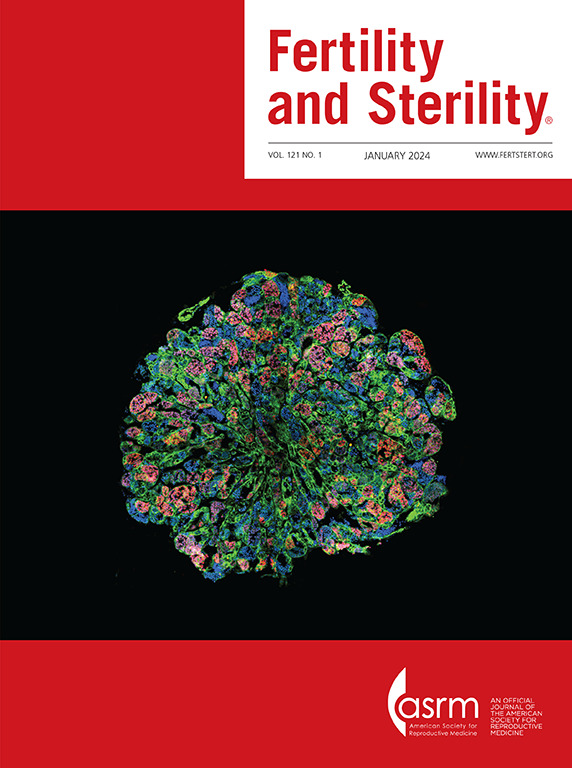Neuropsychological Profile of Polycystic Ovary Syndrome: Past, Present and Future.
IF 7
1区 医学
Q1 OBSTETRICS & GYNECOLOGY
引用次数: 0
Abstract
Polycystic ovary syndrome is a reproductive, endocrine, and metabolic condition affecting 6- 10% of reproductive age women worldwide. Beyond infertility, PCOS may be associated with effects on the neuropsychological profile. Notwithstanding studies attesting to the adverse effects of hyperandrogenism on cognition, few well controlled studies have explored the PCOS neuropsychological profile. We performed a review of current approaches to evaluation of cognition in PCOS in comparison to healthy controls and present our findings organized by cognitive domain. Recent reviews of studies comparing women with PCOS and healthy controls demonstrate increased risk of cognitive decline in areas that include fluency, short term memory, and executive functioning. Cognitive decline is defined as test results greater than 1.5 standard deviations below the mean on objective, validated psychometric tests in comparison to a normative sample. However, findings have been equivocal, with multiple factors considered to potentially be underlying the cognitive changes seen, including functional neuroimaging evidence of fluctuations entrained with the menstrual cycle, as well as the comorbidities of BMI, insulin resistance and depression. Overall, literature dedicated to characterizing the PCOS neuropsychological profile is scant, primarily consisting of small, underpowered, poorly controlled studies. In the future, there is a need for well controlled longitudinal studies incorporating neuropsychological assessment and neuroimaging. Such an approach could better guide the development of future treatment approaches.多囊卵巢综合征的神经心理学特征:过去、现在和未来。
多囊卵巢综合征是一种生殖、内分泌和代谢疾病,影响全世界6- 10%的育龄妇女。除了不孕不育,多囊卵巢综合征还可能与神经心理方面的影响有关。尽管研究证实了雄激素过多对认知的不利影响,但很少有对照良好的研究探讨了多囊卵巢综合征的神经心理学特征。我们对目前评估多囊卵巢综合征患者认知能力的方法进行了回顾,并将其与健康对照进行了比较,并按认知领域组织了我们的研究结果。最近对多囊卵巢综合征女性和健康对照者的研究综述表明,在流利度、短期记忆和执行功能等领域,认知能力下降的风险增加。认知能力下降的定义是,与规范样本相比,客观、有效的心理测试结果比平均值低1.5个标准差。然而,研究结果一直模棱两可,有多种因素被认为可能是所见认知变化的基础,包括月经周期波动的功能性神经影像学证据,以及BMI、胰岛素抵抗和抑郁症的合并症。总的来说,专门描述多囊卵巢综合征神经心理学特征的文献很少,主要是由小型、动力不足、控制不良的研究组成。在未来,有必要进行控制良好的纵向研究,包括神经心理学评估和神经影像学。这种方法可以更好地指导未来治疗方法的发展。
本文章由计算机程序翻译,如有差异,请以英文原文为准。
求助全文
约1分钟内获得全文
求助全文
来源期刊

Fertility and sterility
医学-妇产科学
CiteScore
11.30
自引率
6.00%
发文量
1446
审稿时长
31 days
期刊介绍:
Fertility and Sterility® is an international journal for obstetricians, gynecologists, reproductive endocrinologists, urologists, basic scientists and others who treat and investigate problems of infertility and human reproductive disorders. The journal publishes juried original scientific articles in clinical and laboratory research relevant to reproductive endocrinology, urology, andrology, physiology, immunology, genetics, contraception, and menopause. Fertility and Sterility® encourages and supports meaningful basic and clinical research, and facilitates and promotes excellence in professional education, in the field of reproductive medicine.
 求助内容:
求助内容: 应助结果提醒方式:
应助结果提醒方式:


